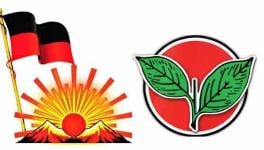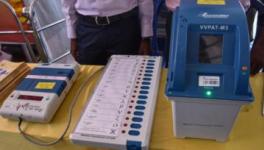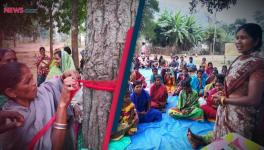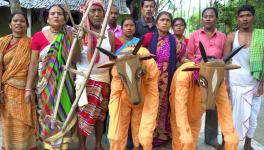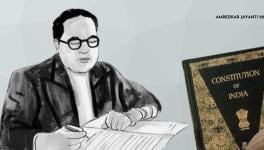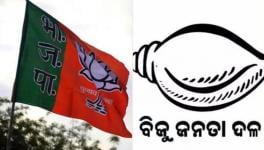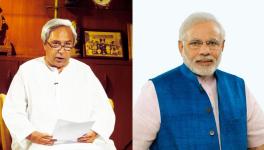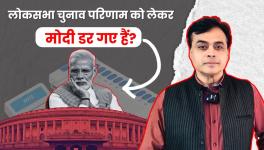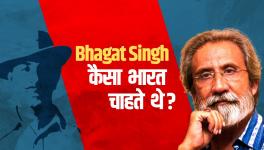Dissecting Communal Riots in Bihar: Two Lakh Swords and Plenty of Hateful Songs
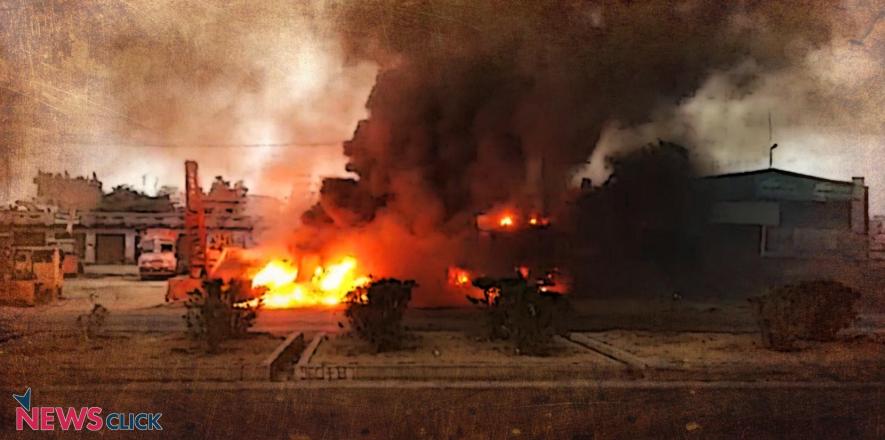
Newsclick Image By Sumit
Professional orchestration and meticulous planning was involved in the communal violence that took place in the nine districts of Bihar from March 25 to 28. The riots claimed one life and around 65 were injured.
Newsclick had earlier reported that swords, CDs and pen drives – containing Islamophobic songs – were distributed to be played on loud speakers during the Rama Navami processions. The lyrics of the songs were so provocative that violence was bound to happen.
Take a look at some of the songs that were allegedly played while the processions were forcibly made to enter the Muslim-concentrated localities:
‘Pakistan mein bhejo ya qatleaam kar dalo, aasteen ke saanpon ko na dugdh pilakar palo’
'Jis din jaag utha hindutva to yeh anjam bolega, topi wala bhi sar jhuka kar Jai Shri Ram Bolega’
‘Dur hato Allah walon, kyun janmabhoomi ko ghera hai, masjid kahin aur banao tum, yeh Ram Lalla ka dera hai’
‘Sun lo mullon Pakistani, ghusse men hain Baba Barfani’
Majority of these songs have been uploaded on YouTube around a year ago and have fetched millions of views. These songs were seemingly shared via pen drives and CDs, to be circulated, apparently, with an aim to foment communal tension in the regions that have been peaceful for years.
Locals at Old Qazi Muhalla at Nawadi Road in Aurangabad district – nearly 130 kilometres from state capital Patna, told Newsclick that there was no tradition of any procession on the occasion of Rama Navami before, which is celebrated to mark the birth of the Hindu deity Rama.
“They have started organising these processions 4-5 years ago, but there was something new this time. One, a large number of people, mostly new faces, took part in the procession. Majority of them were on motorbikes. Each bike carried two-three people. Two, the crowd was aggressive. Three, a number of participants were brandishing swords,” said Hira Lal Gupta, a local in his late 60s.
Another local Nishat Ahmad said that Nawadi Road was targeted because “the area has a mixed population, and people belonging to the two communities have been in peaceful coexistence for decades”.
He further reasoned, “New faces with saffron headbands were moving around in the locality for about a week before the festival, perhaps, with an aim to do a recce”.
Nawadi Road is a narrow lane with two to three-storey buildings on either side. Many houses exhibit the religious identity of its residents using colours of the flags (saffron for Hindus and green for Muslims) planted on their rooftops. However, one cannot see any sign of obvious animosity. It is a tightly packed urban settlement, but certainly not a ghetto. There is no clear division of Hindu and Muslim areas in this neighborhood.
The conflict started emerging after a few locals opposed the “forced entry” of the bike-borne participants of the Rama Navami procession that began on the March 25 evening, from somewhere near Maharana Pratap statue chowk (square) and passed from the main market area.
“When the procession was passing through the market, loud and provocative tracks were being played and slogans were shouted. The participants were brandishing weapons like swords. Some of them suddenly took a U-turn and tried to enter the Nawadi Road. Muslim youths present at the spot objected and it led to the outset of the violence. Both the sides started pelting stones on each other. Soon, a few shops near the Ramesh chowk were set ablaze. After lapse of good amount of time, they [Police] rushed to the spot and pacified the crowd,” Md Fahimuddin Nadavi, an eyewitness, told Newsclick.
The crowd returned again the next day (March 26) with more aggression and again took out a procession. This time, Sushil Kumar Singh – the Bharatiya Janata Party (BJP) Member of Parliament (MP) from Aurangabad – added fuel to the fire. He allegedly instigated the violence by reportedly saying that “there is a reaction to an action”.
“The crowd taking part in the March 26 procession was more aggressive. Sensing the trouble, we had not opened our shops on that day. They did whatever they could by setting several shops on fire. Few shops – including mine – owned by the Hindu community were turned to ashes. It means, they were outsiders because locals knew which shop is owned by which community,” said Narender Ram, a local, whose shop Samrat Band was set ablaze.
Swords were brought from outside Bihar
One allegation that is common in the versions of both sides that the mob was carrying swords. If sources are to be believed, these were imported from outside and distributed across the districts for free. One businessman from Patna had alone placed an order for 50,000 swords from a supplier in Meerut, in Uttar Pradesh.
Highly-placed officials in the state told Newsclick that around 2 lakh sharp-edged weapons were consigned to the affected districts from outside the state. Sword sellers in Sonepur fair had run out of stock just two days after the fair was inaugurated, which could mean that preparations for the violence have been going on for a long time.
A Newsclick investigation has discovered that order of the consignment was placed through an online shopping portal. As one registers for their order on the website, they get a call from its marketing officials to take details of your requirements. While the questions are asked about price range, quantity and the place where the consignment has to be delivered, the purpose behind the purchase is not questioned.
The marketing official informs the buyer that they will get a call from the supplier. As the person posing as a customer gets a call from a Meerut-based supplier, he takes down details like the required quantity, the price range the customer is looking for, the type of material (stainless steel or other superior quality), whether the weapon should be double-edged, and where the consignment is supposed to be delivered. He informs that the consignment will be couriered to the address provided. Despite repeated questions about the courier agency, the supplier does not disclose its name. During the conversation, the supplier discloses that he has got a huge demand of swords from Bihar. “A businessman based in Patna had recently placed an order for 50,000 swords which we have delivered,” the supplier tells the person who is posing as a customer.
The ‘customer’, in this case, asked the supplier to wait for his confirmation and hung up the call.
This entire conversation indicates that a huge quantity of swords were brought from outside the state. Those with the better know-hows of the turn of events told Newsclick that the swords were new and carried the same brand name. This was also confirmed by Uday Narayan Choudhary, senior Janata Dal (United) leader and ex-speaker of the Bihar Assembly.
“It was a preplanned attack by the BJP (Bharatiya Janata Party, which is coalition partner of the Bihar government) and the RSS (Rashtriya Swayamsevak Sangh, the ideological mentor of the BJP). RSS chief Mohan Bhagwat was here for 14 days to plan the trouble during Rama Navami (an allegation that has earlier been leveled by Leader of Opposition in the Bihar Assembly Tejashwi Yadav),” Choudhary told Newsclick.
Get the latest reports & analysis with people's perspective on Protests, movements & deep analytical videos, discussions of the current affairs in your Telegram app. Subscribe to NewsClick's Telegram channel & get Real-Time updates on stories, as they get published on our website.









